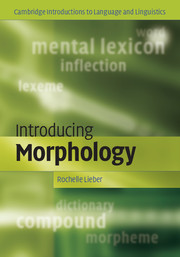Book contents
- Frontmatter
- Contents
- Preface
- The International Phonetic Alphabet
- Point and manner of articulation of English consonants and vowels
- 1 What is morphology?
- 2 Words, dictionaries, and the mental lexicon
- 3 Lexeme formation: the familiar
- 4 Productivity and creativity
- 5 Lexeme formation: further afield
- 6 Inflection
- 7 Typology
- 8 Words and sentences: the interface between morphology and syntax
- 9 Sounds and shapes: the interface between morphology and phonology
- 10 Theoretical challenges
- Glossary
- References
- Index
10 - Theoretical challenges
- Frontmatter
- Contents
- Preface
- The International Phonetic Alphabet
- Point and manner of articulation of English consonants and vowels
- 1 What is morphology?
- 2 Words, dictionaries, and the mental lexicon
- 3 Lexeme formation: the familiar
- 4 Productivity and creativity
- 5 Lexeme formation: further afield
- 6 Inflection
- 7 Typology
- 8 Words and sentences: the interface between morphology and syntax
- 9 Sounds and shapes: the interface between morphology and phonology
- 10 Theoretical challenges
- Glossary
- References
- Index
Summary
CHAPTER OUTLINE
In this chapter you will get your first taste of the theoretical challenges that morphologists face.
We will consider what the best way is to characterize morphological rules.
And we will examine several theoretical controversies that have occupied morphologists in recent years: the extent to which rules of morphology and rules of syntax can interact, the nature of blocking, the best way to analzye so-called bracketing paradoxes, and the characterization of affixal polysemy.
KEY TERMS
Item and Arrangement, Item and Process, Word and Paradigm, realizational, model, multiple, exponence, Lexical, Integrity, Hypothesis, blocking, bracketing, paradoxes
Introduction
Up to this point, we've spent a lot of time looking at the way morphology works in languages – what kinds of morphemes there are, what to call them, how to analyze data, and so on. This is an important and necessary first step to becoming a morphologist, but there's more to morphology than just being able to analyze data. When we study morphology, or indeed any of the other subfields of linguistics, we have a much larger goal in mind, which is to characterize and understand the human language faculty. Put a bit differently, our ultimate goal as linguists is to figure out the way in which language is encoded in the human mind. For morphologists, our specific goal is to figure out how the mental lexicon is encoded in the mind.
- Type
- Chapter
- Information
- Introducing Morphology , pp. 177 - 196Publisher: Cambridge University PressPrint publication year: 2009



